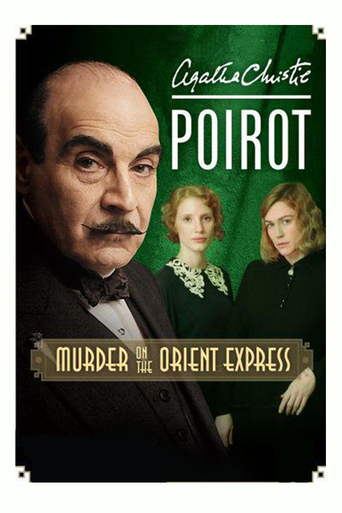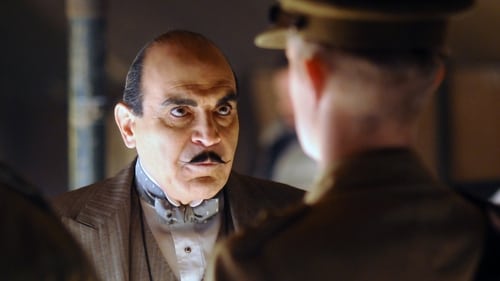


This version I loved. Poirot as a person delivering justice all his life, and facing a situation as this, would not easily have let the vigilantes go. It would indeed go against his principles. In all the stories he has always, no matter the circumstance, let the guilty pay the price. He has been sometimes diplomatic about it, but he has never let anyone go. He has given speeches about the justice! To let everyone get away with their deed would indeed pain him, as is so very well shown by Suchet in the end. He questions God, questions what is His true will and can he live with a God who allows revenge. The ending here is very deep and very disturbing if we think of what really happened. 12 people murdered 1 man. They had a reason. We all agree on that. But does that mean that murder is ok under certain circumstance? WE can think so, but what about Poirot? Who was always fighting for justice, not for revenge? I do not think it would be so easy for him. And this is why I really appreciate this version. Here we see the character of Poirot take on flesh beyond the books, we see him become a real person.
... View MoreAgatha Christie was the greatest exemplar of the mystery story because of her range. She wrote stories where the most obvious suspect did it, where the narrator did it, where no one did it, and where everyone did it! And "Murder on the Orient Express" ranks right up with "The Murder of Roger Ackroyd" as one of her most famous yarns, both because the book is well known and because of the famous 1974 movie version.My first exposure to Agatha Christie as an innocent schoolboy was the gala all-star 1974 "Murder on the Orient Express." Though I never became a Christie aficionado until nearly twenty years later, I have enjoyed that version immensely then, and upon repeated viewings.I was wary of David Suchet's version. While alterations are necessary as stories shift from a literary to a visual medium, some longer "Poirot" episodes made unnecessary changes and their mood was frightfully dark. Better "long" Poirot episodes include "Peril at End House"; "Sad Cypress"; "Third Girl" (changed, but an improvement over the book); and "The Clocks." Meanwhile, among the more egregious misfires are "Appointment with Death"; the, admittedly, difficult "Murder of Roger Ackroyd"; and the simply boring "Murder on the Blue Train."I tried to divorce myself from the earlier flick while enjoying this "Poirot" but I fear echoes of the past kept sounding in my mind. I don't have this sort of trouble with "Hamlet"; but with "Poirot" I kept missing the humor and joie de vivre of the earlier version even amidst the murder, and the panache it showed from casting to costuming to the jaunty score. And I really miss Jacqueline Bisset!My fault, I know. If you haven't seen the earlier version, or think Albert Finney's 1974 vision of Poirot was an affront to Christie (I know people who hated Finney who accepted the buffoonish Peter Ustinov!) then you might enjoy this more realistic retelling of Christie's most famous story.
... View MoreIt happened more than once that a death occurred while I was on a train, just in my case, it was a suicide on the tracks, not a murder. This 2010 adaptation of a Christie classic starring the brilliant David Suchet can be credited with the same good stuff we're used to by now- excellent production design, period-accurate interiors and costumes. What makes the movie interesting is the combination of a small enclosed space-train cars stuck in snow-with a group of colorful characters made of a Russian princess, an American governess, a former driver and a doctor, among others. During the night, one of the passengers is stabbed to death in spite of having had asked Poirot for protection, which he refused. Of course, Poirot starts an investigation and unfolds a surprising connection of all passengers with the murder case of a young American heiress. Being from former Yugoslavia, it is a bit flattering that Christie set the novel within the country. In many recent episodes, Poirot is portrayed with a devout, religious side to his character, which in my mind is too much in contrast with his logic-based approach to solving his cases. "Murder on the Orient Express" is a great example of that, because it obscures the line between poetic justice and morals. Eileen Atkins and Jessica Chastain deliver great performances as the wax-faced and stoic Princess Dragomiroff and Miss Davenham, the fragile teacher. The solution is the only one of that kind in the whole Poirot series, based on the disappointment into the judicial system and the individual right to exert justice when being let down by official institutions in charge of it. In the end, you're left wondering what you would have had done in Poirot's position, and this might be the only episode in the series to have such an effect on you. The gorgeous winter landscape only accentuate the cold-blooded manner of the murder, clashing breathtaking beauty with breathtaking cruelty. I'm not one to mind on-screen plot alterations as long as they're subtle and add to the effect of the movie, which was certainly the case here. Which is why I prefer to regard it as an individual work, not that common in the Christie crowd, it seems.
... View MoreEven if you have never seen the film version from the 1970's, or read the book, this is probably the Agatha Christie story that you already sort of know the conclusion of; it is nearly one of those things that is generally known even if you are not sure why you know it. This was the case with me; I think I had seen the film, but for sure I knew who did the murder and how it was resolved – and I guess this is the case for many people coming to this 2010 television event. So the question is what would be done with a mystery that has no actual mystery for the majority of viewers?The answer is that actually the mystery is almost pushed to second billing behind making Poirot the focus of the whole film. Despite having let people get away in the past, this film portrays Poirot as having an unshakable faith in justice, and in his Catholicism; this is seen in an impacting opening sequence, and his cold acceptance of a barbaric stoning of a woman. The setup and the interviews are delivered briskly – perhaps a bit too quick to draw the viewer into the mystery, but again I think this was deliberate since the assumption was made that most fans of the series would already know where this was going – and to change such a fundamental part of the book was obviously not an option. So while the supporting characters perhaps do not make as much of a mark as one would like, Poirot himself is given plenty of time to think, to react, and to struggle. This aspect makes for an engaging film because it does open up the character by making us see the weight of his years and experiences; in some ways it is a bit sudden, but in others it is logical and links to previous films in the series.Suchet benefits greatly from this material. Previously I have enjoyed his comedic timing and light touch, but here he makes the most of a brooding character – not all of it makes sense perhaps (as mentioned, he has let others go before) but he sells the internal struggles well. The supporting cast may not have as much to do as Suchet, but ironically it is probably the starriest cast yet; Jones, Morrissey, Chastain, Hershey, Bonneville, and others all provide good presence and a sense of quality, and this does rather cover up for how little they have to do.It is not the most gripping as a film, and I think for those not familiar with the plot then it is not a good adaption to start with, simply because so much about it seems to assume you will already know the ending; however the brooding air, and the focus on a struggling and weary Poirot is what makes it work, while the famous supporting cast provide quality in the small moments they have.
... View More